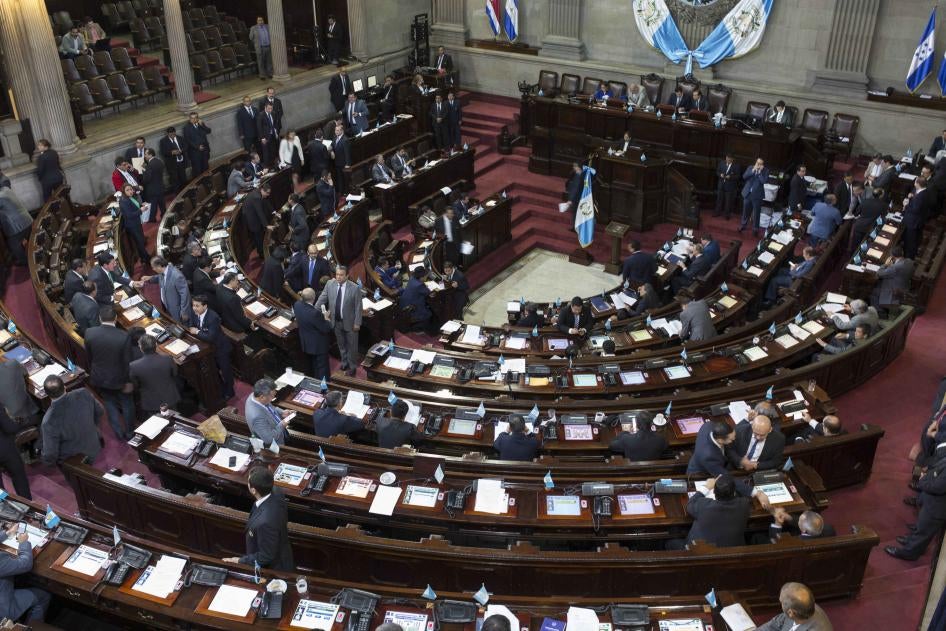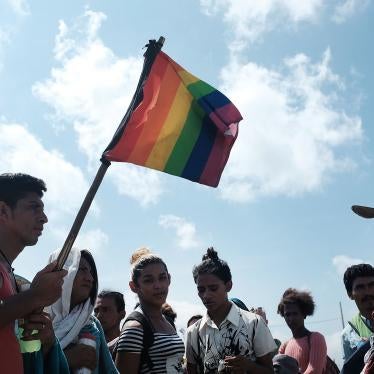(New York) – A group of lawmakers in Guatemala has advanced a bill that would stigmatize transgender people and curtail children’s and adolescents’ rights to education, information, and health, Human Rights Watch said today. Congress should reject the bill and instead address the violence and discrimination that lesbian, gay, bisexual, and transgender (LGBT) people face in the country.
Bill 5940 uses the rhetoric of protecting children and adolescents from “gender identity disorders” to justify a patently discriminatory measure that would ban the dissemination of any information about transgender identity in school sex education curricula. The bill would also require media outlets to label programs with transgender content, which the bill likens to pornography, as “not recommended” for children under 18.
“Bill 5940 is unscientific and stigmatizes transgender people as a corrupting influence, harmful to children,” said Cristian González Cabrera, LGBT rights researcher at Human Rights Watch. “Lawmakers should aim to promote tolerance, not demean a vulnerable minority, especially given the high levels of anti-trans violence in Guatemala.”
The twenty-one lawmakers in the Congress’ Commission on Education, Science, and Technology unanimously approved the bill in December 2021. The bill is now poised to go before the full Congress, where it would need to be the subject of three congressional debates and a final vote before becoming law
The bill flies in the face of international human rights standards and science, Human Rights Watch said. The World Professional Association for Transgender Health, an international multidisciplinary professional association aimed at promoting evidence-based care, education, and research in transgender health, has stated that diversity in gender identity “is a common and culturally diverse human phenomenon [that] should not be judged as inherently pathological or negative.”
The World Health Organization’s new International Classification of Diseases (ICD-11), which came into effect in January 2022, removes “transsexualism” and “gender identity disorder” as “mental disorders.”
Under international law, children and adolescents have a right to comprehensive sexual education. The UN special rapporteur on the right to education has noted that sexuality education “must be free of prejudices and stereotypes that could be used to justify discrimination and violence against any group,” and “must pay special attention to diversity, since everyone has the right to deal with his or her own sexuality without being discriminated against on grounds of sexual orientation or gender identity.”
Violence against LGBT people is commonplace in Guatemala, and the bill risks adding to the existing prejudice and stereotypes that often fuel such violence, Human Rights Watch said. Guatemala’s Human Rights Ombudsperson’s Office reported that between December 30 and January 2, two trans women and one gay man were murdered in separate attacks. This follows an already bloody 2021 for LGBT people in Guatemala, in which transgender people were particularly vulnerable.
In March 2021, Human Rights Watch published a report on violence and discrimination against LGBT people in Guatemala. Human Rights Watch interviewed 53 survivors of anti-LGBT abuses – including 24 gender non-conforming people – and found that the attackers included public security agents, gangs, and members of the public. It also found that the government had failed to adequately protect LGBT people against such illegal acts.
Bill 5940 would also continue to erode comprehensive sexuality education in Guatemala, which is already regressive. A 2017 report from the Guttmacher Institute found that many teachers providing sexuality education lack adequate time, resources, and training, especially on contraceptive methods, HIV/sexually transmitted infections, and violence. The Institute also found that teachers convey mixed messages about sexuality, including the harmful and stigmatizing message that sexual relations are dangerous and should be avoided before marriage.
Withholding age-appropriate and science-based information about gender and sexuality from students, including information relevant to students’ sexual and reproductive health, and prohibiting teachers from offering guidance and learning materials on these issues, amounts to a violation of students’ right of access to information, Human Rights Watch said.
The UN Committee on the Rights of the Child has identified lack of “access to sexual and reproductive health services and information” as a particular issue for “[a]dolescents who are lesbian, gay, bisexual, transgender and intersex.” It said governments should “refrain from censoring, withholding, or intentionally misrepresenting health-related information, including sexual education and information, and … ensure children have the ability to acquire the knowledge and skills to protect themselves and others as they begin to express their sexuality.”
Bill 5940’s requirement that media outlets label all material related to gender identity unsuitable for minors not only denigrates transgender people but may result in violations of the right to freedom of expression. The Inter-American Commission on Human Rights has said that the media should promote “an environment of peace, free from all forms of violence in relation to the social environment in which it is situated, generating safe and inclusive spaces for LGBTI people.”
The bill is not the only legislative attempt aimed at stigmatizing LGBT people in Guatemala. The pending Life and Family Protection Bill describes “sexual diversity” as “incompatible with the biological and genetic aspects of human beings.” It also establishes that “freedom of conscience and expression” protects people from being “obliged to accept non-heterosexual conduct or practices as normal,” a provision that could be used to justify discriminatory denial of services.
The Organization of American States General Assembly has called on member states to adopt public policies against discrimination based on sexual orientation and gender identity or expression, yet Guatemala currently provides LGBT people with virtually no protections.
“Instead of stoking a moral panic by demonizing LGBT people, lawmakers should pass anti-discrimination and hate crime legislation to address pervasive violence,” González said. “They should also uphold children and adolescents’ right to comprehensive sexuality education, which can protect health, promote tolerance, and help prevent gender-based violence, including against gender and sexual minorities.”







